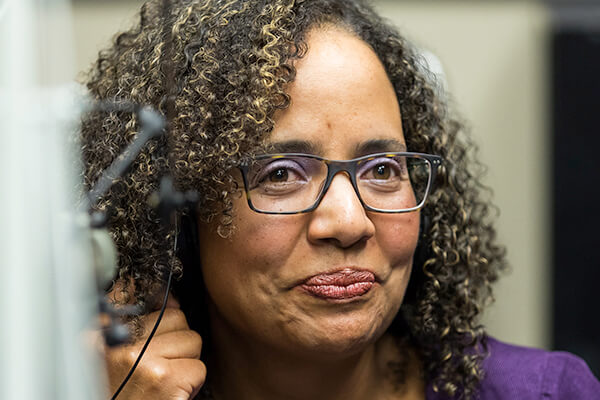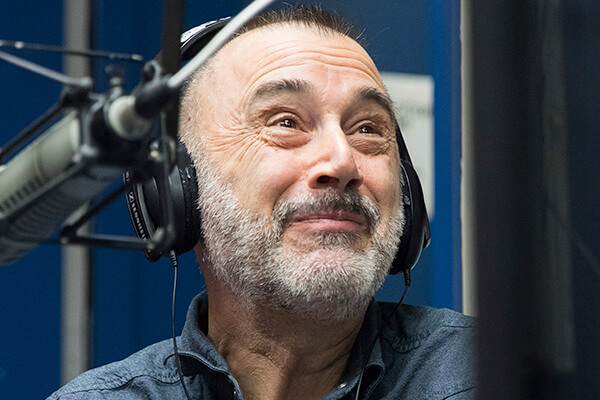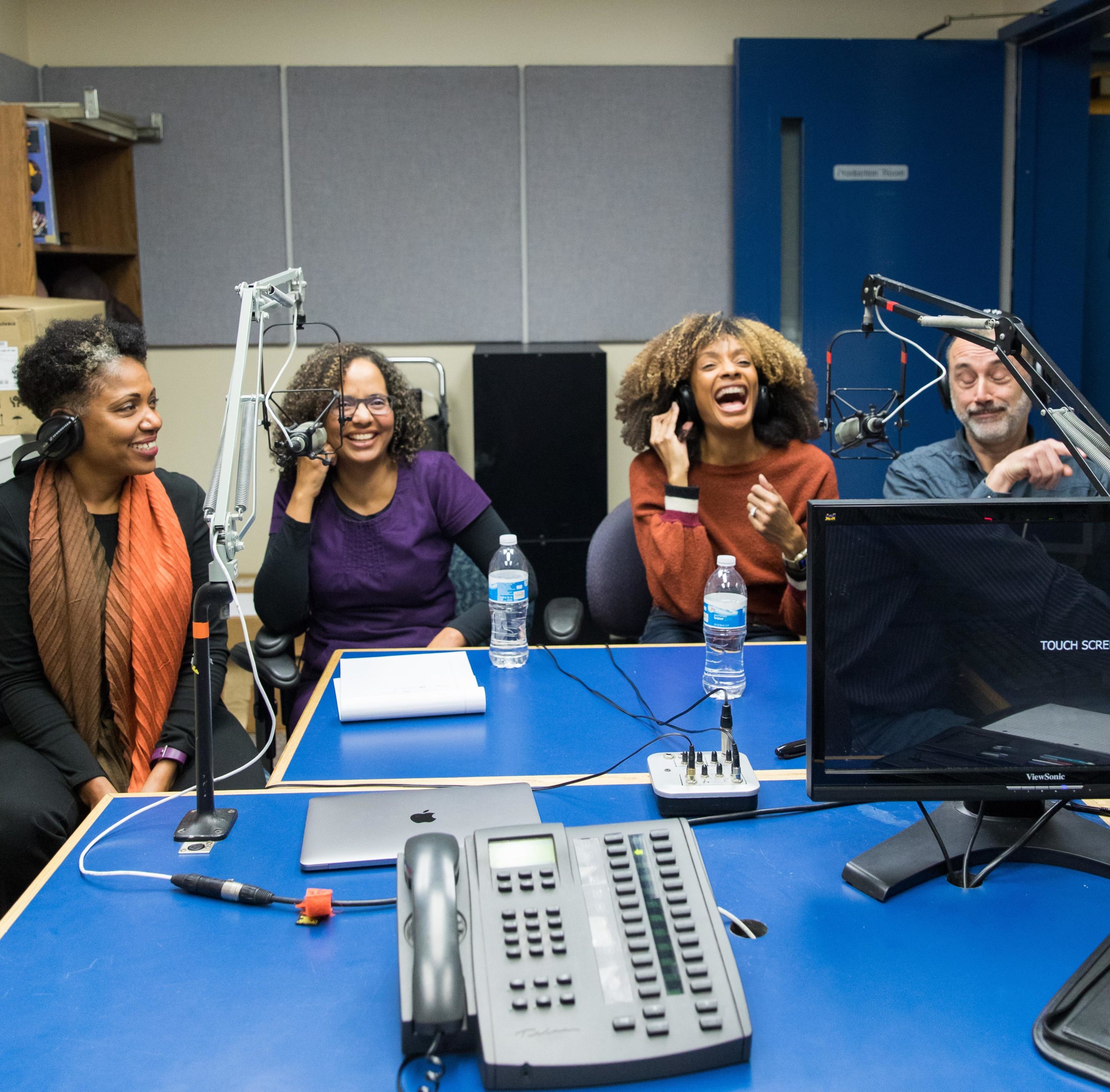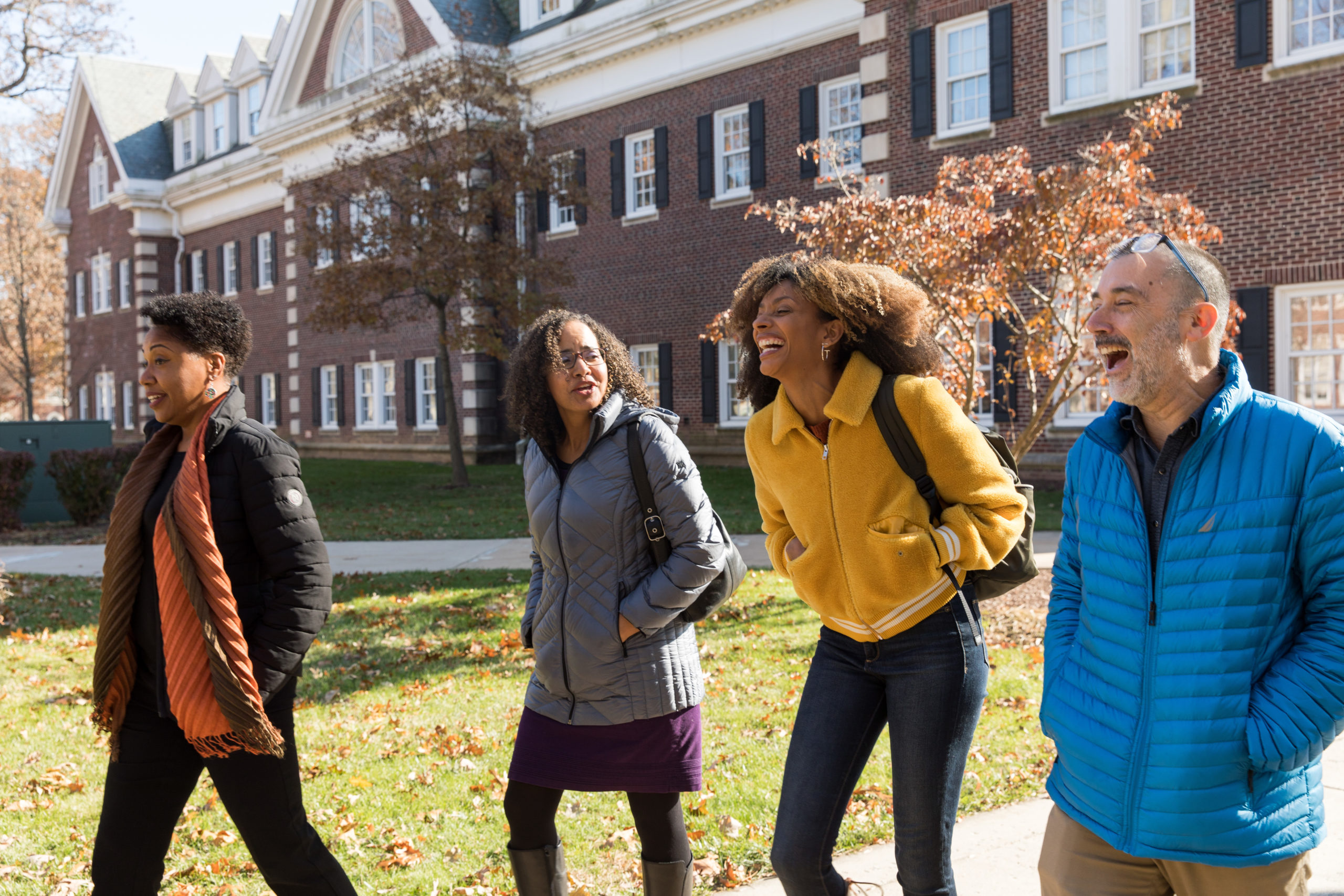Secrets make compelling reading when authors are willing to take risks.
More than two years ago, four professors started meeting off-campus as “readers and friends, talking about novels and our lives.” Like a book club, in other words. Except it was far from a typical club.
First, everyone had a PhD: Juda Bennett, Cassandra Jackson, Piper Kendrix Williams from the Department of English, and Winnifred “Winnie” Brown-Glaude from sociology and African-American studies.
Second, they chose to center their discussion on Nobel Laureate Toni Morrison, best known for capturing the complexities of the black experience in
America. “How do her novels — embedded as they are in history — speak to us now?” they asked. “How can her words illuminate the problems of everyday racism and guide us toward healthy responses and greater clarity?” Acknowledging Morrison’s fervor for truth-telling, they disclosed often difficult secrets about their own experiences around issues of race, prejudice, and identity.
Then they created The Toni Morrison Book Club. Booklist gave it a starred review, calling it “a beautiful homage to Morrison’s legacy, and a light on all the work there is left to do.”
Cultural critic Roxane Gay spoke with them in November via Skype. Their discussion follows, interspersed with excerpts from the memoir.
The cast:

Roxane Gay

Piper Kendrix Williams

Cassandra Jackson

Juda Bennett

Winnifred Brown Glaude
Gay: How did you decide to become a book club?
Bennett: I don’t think we knew it was a book club at first. I had an idea and I threw that out to Cassandra saying, “Hey, what if we were to write something
between memoir, cultural criticism, but also literary criticism, using Morrison as our muse?”
Jackson: And I said, “Oh, hell no.” I just thought all these people have written about Morrison, there were so many who felt a certain kind of ownership of her legacy. Honestly, it felt intimidating. So I told him, “You get Winnie to agree to do it and I’ll do it.”
Brown-Glaude: I’m the sociologist. Cassandra must have thought I would shy away from it but when Juda asked me to be a part of this project, I thought it was so exciting.
Bennett: I thought you would stretch the group because you are coming from such a different place.
Gay: I noticed you are not afraid to talk about race and the ways in which race complicates how we interact in the world. How did you get to a place
of being able to have those difficult conversations without, for example, making the white guy feel comfortable in his whiteness?
Williams: It helped that we were already friends. I never thought Juda was someone I can’t have a conversation with about race. There’s definitely white people you cannot talk to about race.
Brown-Glaude: There are chapters that Juda wrote that didn’t make the book where he’s really trying to wrap his mind around and interrogate whiteness. But just his willingness to even go there with us brought us closer. It was safe for us to be honest and vulnerable.
Gay: Were there any tensions you were not able to resolve when you were talking about anything, not necessarily race?
Jackson: There were never any big blow-ups. But the one thing I would say akin to that was getting information out of Winnie, which is not easy. When Winnie cracked, I was like, “Oh, we got this,” because she was the emotional Fort Knox of the group at the time. You want to talk about that, Winnie?
Brown-Glaude: I had to give myself permission to open that box and share that anger and fear and feel okay about it. It took a little while for me to go there. Part of it has to do with our undocumented status when I first came to this country with my family. That stuck with me into my adult years.
Bennett: We’d get together around my kitchen table to talk about process or how to shape chapters, and it would evolve into just chatting as friends. If I could give an example, Winnie said, “Well, you know [my husband] Eddie and I were debating whether we should buy a gun for protection.” And we’re like what? “You gotta write it.”
Gay: Each of you shared a secret, which requires a lot of vulnerability. Wanting to buy a gun for protection, especially in a world where black bodies are all too often the target of guns, is a really difficult thing. I was really interested that you were able to bring that to the group to talk about and wrap your mind around gun ownership, not only as a human being but as a black woman. I’d love for you to talk more about that.
Brown-Glaude: A lot of it has to do with having to even think about it. It angers me that I have to do that. I just want to be able to just live and just be. I grew up with a gun in my house. My husband is from Mississippi; he grew up with a gun in the house. For me, it’s not just the gun ownership, it’s because I don’t feel safe because of all that’s going on.
Gay: It’s incredibly frustrating especially in a country that always tells us that we’re safe and we are always going to be protected. That’s not the case, it’s rarely the case.
Brown-Glaude: Despite the evidence that we’re not safe, they’re still telling us that you can trust the police. We’ll take care of you. No, the evidence doesn’t suggest that. So just be honest with me.
Gay: What other ways do you think this world is not honest with us?
Williams: It’s not honest about our past, about lynching, racial violence, terrorism, slavery as the economic foundation of the country, and evangelicals as really motivated by race.
Jackson: If anything, Morrison’s legacy was definitely speaking those difficult truths. We talk in the introduction about this idea of what it means to live in a moment people are calling “post-truth.” I do feel that’s where some of the secret-telling came from in the book.

{Book excerpt}
Black life and the dead deer
Somebody — and I know exactly who he is and where he lives — has dragged a dead deer more than 100 yards from where it was discovered and deposited it behind my house.
My son, Langston, is home from his third year at college, and he wants to confront the neighbor.
I ask him not to. I beg him not to. The man is white. We are black. This smells like trouble.
So we brace ourselves for the ghastly job of dragging the carcass to the street where the city will dispose of it. We have already called. They will pick it up soon — but not if it’s on someone’s property.
The neighbor probably knows this but looking at the slope and distance to my yard versus the street, he chooses us. He is probably watching everything from his window and so he will see Langston and me dragging the carcass to the street. We will clean up his mess. We will not confront him. Who knows if he has a gun. Don’t all white men standing behind closed doors have guns?
[My son] thinks my worries are overstated, but he is wrong: Black men are being shot every day for less, and I am sure as hell not going to let him die because some fool white man has decided to dump a dead deer in my backyard. —Winnifred Brown-Glaude
Gay: [The poet] Audre Lorde talks about this a lot in her writing — that our silence will not save us. We certainly see that exemplified by everything Toni Morrison did. And she was always radical in her truth-telling. What for each of you is the most radical truth that you share in this book?
Brown-Glaude: I get very angry at mothers of white sons because they don’t have to experience the fear I feel raising my son.
Jackson: Thinking about mental illness in my family and all the other names we had given to it, in part, because there wasn’t necessarily treatment available for the things we were experiencing and also because of real fear about what it meant to be black and experiencing mental illness. I grew up in rural Alabama in a community where there was a lot of segregation and poverty and we grew up working class. I had stories my mother would tell me as jokes, like the time her brother tried to kill her with an axe, but it wasn’t a joke. Humor was her way of coming to terms with it. The Bluest Eye really made me think about that. I’m not understanding because in my mind black women and girls, they don’t go crazy. You get stronger —
Gay: We’re not allowed to go crazy.
Jackson: We’re not allowed to go crazy, exactly. You’re supposed to be like a Maya Angelou poem or something.
{Book excerpt}
Why black folks go crazy
I was 18 when a boyfriend lent me The Bluest Eye. I devoured all of its strange familiarity: the host of characters who were black like me, the Dick and Jane reading primer that I had learned to read with, the separate white world by which everything in my black one was judged inferior. I had never read a book in which every character who mattered was black. I read quickly, hungrily. But when I reached the final pages, I got lost. I could not make sense of what was happening. Obviously, Pecola’s eyes had not turned blue. So why would she think they were blue? Couldn’t she see her own brown eyes in the mirror? And who was she talking to?
My boyfriend picked me up soon after I had finished the book. “What did you think of the ending?” he asked. I was too embarrassed to admit that I didn’t understand. “But the ending? The ending?” he kept saying.
Finally, I admitted that not only did I not understand the ending, but I also wasn’t even sure if you could call that an ending.
“She went crazy,” he said. —Cassandra Jackson
Williams: The hardest thing for me to talk about is my secret experience growing up in Southbury, Connecticut, as the only black girl trying to get through puberty, dating, and being viewed in that exotic, weird way that now I’ve learned to call fetish. I can remember a moment talking with Cassandra [when we were at Spelmen College in Atlanta together], who was like, what about that white guy you dated? No, that other one, and the one in math class? Just the idea that they were racking up was frightening.
{Book excerpt}
Too many white guys
In Toni Morrison’s A Mercy, Florens — while just a child of eight — is targeted as a sexual object, causing her mother to ask a “kinder” slave owner to purchase her daughter. Jacob Vaark, the reluctant slave owner at the center of the story, is the best master that Florens’ mother can hope to have for her daughter, and she begs him to rescue her daughter from the desires of a Portuguese slave owner. This is the mercy of the novel, a transfer of ownership, one that saves the young girl from a life of rape and sexual subjugation. In this powerful glimpse into the past, Morrison imagines the degradations that black women faced and the trauma of violence upon their bodies.
Why do we need to know, so many years later, the specific ways that black women in the antebellum South experienced this constant threat of physical and psychic violence? What can it tell us about the reduction of black women in our own time to a fetish? There has been, indeed, an explosion of writers addressing the dangers of the fetishization of women of color and its link to white supremacy and slavery, and although many young women of color may not have always had the language to name these early assaults on their bodies and humanity, many of us carry those first disturbing experiences around with us like invisible bruises. —Piper Kendrix Williams
{Book excerpt}
Dangerous music
Being immersed in Toni Morrison’s world was not unlike attending a crowded party in Brooklyn and discovering — as I did one night — that I was the only white person in attendance. These two experiences — to be the only white person at a party and to read Song of Solomon — I would wish for every white person. I would not expect miracles from the experiences, but that’s all I’ve got to offer the white world. It is with amusement that I refer to “the white world,” as if it is something monolithic, recognizable in its dress, and unrelated to me. But it is my world, in part a concept in my mind as well as a very real place with many open doors to the privileges that I (and all white people) have. —Juda Bennett

Bennett: When I was in high school I became friends with this black guy who sat in front of me. At one point, he turned around and said, “Do you have other black friends?” I said no, and he said, “Well, you should think about that.” I get emotional just telling the story because I’ve been meditating on that for the last 50 years about all the ways he was giving me a gift. I live in a racist world, which means as a white person I see things that my co-writers don’t, like when another white person will feel, “I can just say this because you’re white.” There’s a lot I’m constantly trying to process in order to be a better human being.
Gay: The times I always think about are when I was living in rural Indiana. A woman at the dry cleaner was talking about “those people” after this Asian man had just left the establishment. I just thought, “Oh my God, she thinks she can invite me into this racist discourse and I’m going to willingly participate.” And the answer was, “No, I was not.” But what do you do in those moments where people invite you into that racist discourse?
Bennett: What I think what you’re really getting after are all the moments where you’re not sure how you intervene. I had a student once who said that she was going to transfer after two years here. She said she went to visit a certain campus, but it was very dark. And, innocent me, I was thinking about the lighting, and then I mentioned it to somebody. I was like, “Is that code for there were a lot of black people on campus?” There are a million moments where somebody is drawing you into something and you’re like, am I complicit, do I even understand it? It’s painful.
Gay: What do you want readers to take from this book?
Williams: I was thinking back to where some interviewer asked Morrison, “Why don’t you ever write about white people?” And she was like, “Please, no one asks white authors that.” The truth she gives us is that we’re human. Black people are human in our full complex humanity — she shows us in our relationships, in our choices, and the way we carry trauma.
Brown-Glaude: And she wasn’t afraid to say, “Hey white folk, you all need to work out your racism. That’s your luggage to carry, it’s not ours.” One of the things we hope readers will take away from this book is the power of truth and secrets. That memoirs and book clubs can be healing moments or spaces where we can speak truths and be unapologetic about it.
Jackson: Read Morrison. One of the early titles of the book was Who’s Afraid of Toni Morrison? We got rid of the title because we realized it did actually scare people. But at the time, I was the one who was scared. Here I am with a PhD in English, and still feeling intimidated by the idea of entering this big conversation about her. I want people to read this book and recognize that Toni Morrison has something for you, too.
Gay: So where does the book club go from here? Is there another writer you want to tackle?
Jackson: They want to do James Baldwin.
Williams: A tempting choice.
Bennett: Let her speak.
Gay: I could already see the second book, Finding Baldwin. You guys are absolutely on the right track.
Jackson: Okay, Roxane Gay said, “Do it.”
Gay: Yes, I did. I did indeed.
Roxane Gay, a New York Times contributing op-ed writer, is the author of Bad Feminist: Essays, Difficult Women, and Hunger and editor of The Best American Short Stories 2018.
Listen to the podcast.
Bennett, Brown-Glaude, Jackson, and Williams recorded their interview with Roxane Gay via Skype. Listen to the full discussion at tcnj.edu/Morrisonpodcast
Story originally featured in the winter 2020 issue of TCNJ Magazine.
